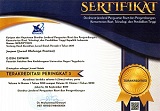MARKETING AND QUALITY OF PENCAK SILAT SCHOOL SERVICES
DOI:
https://doi.org/10.21831/jorpres.v6i1.10328Abstract
In accordance with the development of the era, each Pencak Silat (kind of martial arts) school requires to rethink the objectives and strategy in marketing ofPencak Silat. This is based on rapid changes in technologY; economic, social and cultural rights so that they can follow in accordance with the development and the needs of the community. This rapidly changes can make the privilege principles in carry on business in the past that no longer apply.
The challenge in the recent years, there are many Pencak Silat school face the new problem, they have to fight in a harder globalization competition, for example: the coaching qualities, neglected infrastructure improvement, achievement stagnation, and inability educator. Those are the problem but can be a business opportunity for Pencak Silat School in the marketing process.
Sport activity which involved the facilities called goods and the activity of the coaches called service. Both of the goods products and services cannot be separate in the process of teachinglearning, so, the service quality of Pencak Silat must give many attentions so that it will improve the service quality.
Keywords: marketing, service quality; pencak silat
Downloads
How to Cite
Issue
Section
License
Authors who publish with this journal agree to the following terms:
- Authors retain copyright and grant the journal right of first publication with the work simultaneously licensed under a Creative Commons Attribution License that allows others to share the work with an acknowledgement of the work's authorship and initial publication in this journal.
- Authors are able to enter into separate, additional contractual arrangements for the non-exclusive distribution of the journal's published version of the work (e.g., post it to an institutional repository or publish it in a book), with an acknowledgement of its initial publication in this journal.
- Authors are permitted and encouraged to post their work online (e.g., in institutional repositories or on their website) prior to and during the submission process, as it can lead to productive exchanges, as well as earlier and greater citation of published work (See The Effect of Open Access).




